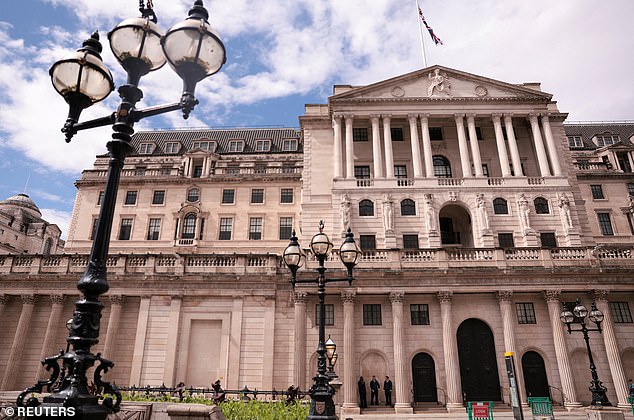Table of Contents
The Bank of England plays down the idea that US interest rate policy has any direct impact on our own.
He argues that British inflation has largely been caused by supply problems following the pandemic and Russia’s aggression in Ukraine.
As of last night, US rates remained at their highest level in 23 years as inflation has been driven by strong consumer demand and business resilience.
Rate debate: Bank of England says UK inflation largely driven by supply problems in the form of pandemic and Russia’s aggression against Ukraine
It will be hard for Britain’s rate-setting Monetary Policy Committee (MPC) to ignore Federal Reserve Chairman Jerome “Jay” Powell’s bold decision last night to cut his key interest rate by half a percentage point to a new range of 4.75 percent to 5 percent.
The first change in four years comes amid a slowdown in U.S. employment and a slowing economy.
The US central bank’s mandate is to keep inflation at 2% without jeopardising employment and growth. Two more quarter-point cuts in borrowing costs are now expected this year.
Technically, a sharp US cut should keep the pound firm against the dollar, which in itself is a barrier to inflation.
Before today’s MPC decision, there was near-unanimous belief among City economists that there would be no change to the bank rate here.
However, as the decision approached, some market players had been anticipating a surprise cut.
The latest consumer price figures suggest that UK inflation has stabilised at or near the 2 per cent target.
Service price inflation caused some concern, but the rise to 5.6 percent was largely driven by what the public now refers to as “dynamic pricing” in the airline sector.
The danger in the UK, as in the US, is that prolonging an era of high interest rates, which hurt consumers, the housing market and business credit, could backfire by slowing growth.
This, in turn, increases the pressure on public finances. Therefore, both the government and the private sector should welcome a further reduction in borrowing costs.
Retail therapy
A pretty big change. Two of the most prominent retailers of recent decades have made a successful job swap. Stuart Rose becomes interim chief executive of the supermarket chain Asda.
Archie Norman, the creator of the modern Asda before it fell into private equity hands, is chairman of Marks & Spencer, where Rose was the last boss to make £1bn in profits in 2007.
The current situation of the two groups offers important lessons on how to run a business. The entrepreneurial Issa brothers, backed by TDR Capital and a mountain of debt, have presided over Asda’s decline.
The interest rate payment took priority over investment in the brand, leaving the door open for German low-cost retailers and rivals Tesco and Sainsbury’s to grab market share.
Private equity takeovers of Walmart-owned Asda and publicly traded Wm Morrison were ill-timed. They increased leverage just as interest rates soared in the wake of Covid-19.
Morrisons is doing everything it can to make a comeback, but Asda has been distracted by dissent between the owners, with Mohsin and Zuber Issa not always working in unison.
Now Mohsin is stepping down, and Rose and TDR’s Rob Hattrell are taking the helm until a more permanent CEO can be identified.
M&S’s comeback, more than a decade in the making, has taken place in full public view. Private shareholders and the late Paul Myners, then chairman, opposed a debt-fuelled bid by Philip Green two decades ago and drove him out of the battleground.
A bold strategy adopted by Norman and executed by Steve Rowe and now Stuart Machin saw dozens of former city centre M&S stores close, a new generation of outlets in retail parks take their place and a strict focus on online, food-only stores and better fashion.
My conclusion is that listed property is far better than private equity. That does not help the ailing Asda.
Big money
How can anyone, companies or countries, compete with the new billionaires of finance? Microsoft and super fund manager BlackRock have teamed up to create a $30bn (£23bn) fund to invest in artificial intelligence, data centres and energy projects.
This puts the ambitions of Chancellor Rachel Reeves and the National Wealth Fund in the shade.
DIY INVESTMENT PLATFORMS

AJ Bell

AJ Bell
Easy investment and ready-to-use portfolios

Hargreaves Lansdown

Hargreaves Lansdown
Free investment ideas and fund trading

interactive investor

interactive investor
Flat rate investing from £4.99 per month

Saxo

Saxo
Get £200 back in trading commissions

Trade 212

Trade 212
Free treatment and no commissions per account
Affiliate links: If you purchase a product This is Money may earn a commission. These offers are chosen by our editorial team as we believe they are worth highlighting. This does not affect our editorial independence.


